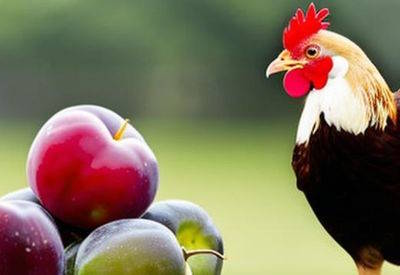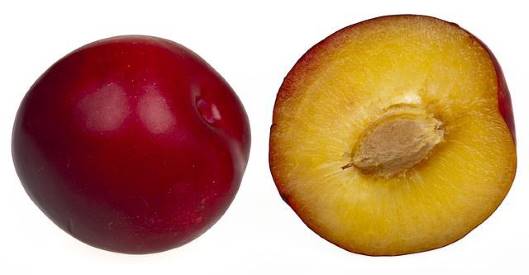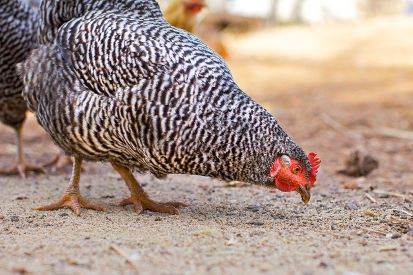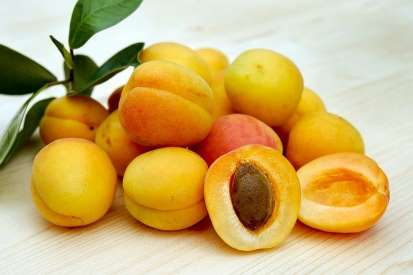Can chickens eat plums? The short answer is yes – chickens can absolutely eat plums! Not only are they safe for chickens, they also offer some beneficial nutrients.
Plums are a great source of vitamin C, potassium, fiber, and antioxidants. They are also very hydrating due to their high water content and can provide your feathered friends with some extra energy on hot summer days.
When feeding plums to chickens, it’s important to remember that they should always be served in moderation. Plums are quite sweet, so providing too many can lead to an upset stomach or diarrhea. This article will provide more information on how to safely incorporate plums into your chicken’s diet.

Can chickens eat plums?
Yes, chickens can eat plums! Plums are a great source of nutrition for your feathered friends and offer some beneficial vitamins and minerals. Feeding plums to chickens should always be done in moderation, however, as too many can cause digestive upset.
When feeding plums to your chickens, it’s important to remember that they can only eat the flesh and skin of the fruit – not the pit. The pit contains trace amounts of cyanide, which can be toxic for both chickens and humans if ingested in large quantities. Therefore it’s best to remove the pits before feeding them to your flock.
Another thing to keep in mind is that because plums contain sugar, they should only be fed as an occasional treat – not as a meal replacement or primary food source. Too much sugar in a chicken’s diet can lead to health problems such as obesity, decreased egg production, and reduced fertility rates.
If you feed your chickens plums regularly, make sure they get plenty of other nutritious food sources such as grasses, insects, and grains.
[ChickenAffiliate]
The benefits of eating plums for chickens
We all know that chickens need a healthy and balanced diet to stay happy. But did you know that plums can be a great addition to your chicken’s diet? Let’s take a look at five reasons why plums make for the perfect snack for your chickens.
Plums are full of essential vitamins and minerals
Plums are an excellent source of vitamin C, which helps keep your chickens healthy. They also contain B vitamins, which help with tissue growth and repair, as well as potassium, magnesium, phosphorus, and other minerals important for overall health.
Plums are packed with dietary fiber
Dietary fiber is essential for digestive health and regularity in chickens. This can help them maintain a healthy weight and allow their bodies to absorb more nutrients from their food.
Plums have anti-inflammatory properties
Chickens are prone to inflammation due to the dust they kick up while scratching around outside or in the coop, so adding plums to their diet can help counter any inflammation they might experience from time to time.
The antioxidants found in plums can also help reduce oxidative stress in chickens, which is linked to disease prevention and longevity.
Plums are delicious
Everyone knows that chickens love tasty treats like fruits and vegetables, but plums provide extra sweetness that other snacks don’t have – making them a favorite among your feathered friends! Plus, since plums are soft fruits, they don’t require any chewing or gulping down whole – which makes them easier on your chicken’s digestion system.
Plums are easy to feed
You can place sliced plum pieces right on the ground or throw them into the coop – no special prep required. And if you want to get really fancy (or just save some time), you can even freeze slices of plum ahead of time for an easy-to-serve treat anytime.
Things to watch out for when feeding plums to chickens

Before you start feeding plums to your feathered friends, there are a few things you should keep in mind. Let’s take a look at three important points to be aware of when giving plums to your chickens.
Remove the Pit First
Plums contain small pits that can pose a choking hazard for chickens if not removed prior to feeding them the fruit. To ensure their safety, you should remove the pit from each plum before giving it to your chickens. It can be helpful to cut the plum into smaller pieces for easier consumption and digestion as well.
Monitor Their Intake
Like with any type of food, moderation is key when feeding plums to chickens. Too much of any one food can cause digestive issues or even lead to obesity over time; therefore, it’s important to monitor how much they eat and generally limit their intake of plums (and other treats) to no more than 10% of their daily diet.
Ensure Variety
Chickens need variety in order for their diet – and overall health – to remain balanced over time. While plums have many benefits and make an excellent treat, it’s best practice not to rely on them exclusively.
Instead, offer your chickens a wide array of fresh fruits and vegetables throughout the week so that they get all the essential vitamins and minerals they need without getting bored with their meals.
How often should chickens eat plums?
Plums are a great snack for chickens and make for an excellent occasional treat. However, due to their sugar content, plums should be given carefully and sparingly; no more than 10% of the chicken’s diet should be composed of fruit and vegetables.
In other words, it is not recommended that chickens eat plums every day as they might consume more sugar than they should. If you do choose to add plums to your chicken’s diet, ensure that it constitutes a very small portion of its overall nutrition.
How to prepare plums for feeding to chickens

Plums are a great treat for your chickens, but it’s important to prepare them properly before giving them to the birds. This guide will walk you through the steps of preparing plums for your chickens, so that you can ensure that they get the most out of their treats.
Wash the Plums
Before feeding your chickens any fruits or vegetables, you should always wash them thoroughly first. Make sure to rinse off all dirt and debris from the plum skin before cutting into it. This will help prevent bacteria from spreading and make sure that your chickens stay healthy.
Chop Into Small Pieces
Once you have washed the plums, chop them into small pieces so that they are easier for your chickens to eat. Depending on the size of your chicken, you may want to cut them into bite-sized pieces or even smaller if necessary. You can also make them easier to eat by mashing or blending them together first.
Remove The Pit
Once you have chopped up the plums, make sure to remove the pit before giving it to your chickens. The pit is not digestible and could cause digestive issues if ingested by a chicken, so always take care when removing it from the fruit before feeding it to them.
No Need To Peel Them
Unlike other fruits, plums do not need to be peeled before being fed to chickens – just make sure that all dirt and debris is removed from the skin beforehand as mentioned in step one. Although some people prefer peeling their plums before feeding them, this step is not necessary and can be skipped if desired.
Remove Any Uneaten Pieces
After feeding time has finished and all of the plums have been eaten, take a few minutes to check around the area and remove any uneaten pieces of plum that may still be lying around – this will help keep pests away from your flock.
Can baby chickens eat plums?
As adorable as baby chicks may be, when it comes to potential diet items, not all snacks are suitable for their tummies. One of the most common questions people have been asking is whether baby chicks can eat plums. The answer is yes, but there are some things to consider.
Plums can technically be a part of their diet, but because they do contain sugar, one should be mindful of how much they feed at one time. Also, make sure to remove any pits before offering the fruit as a treat and they should never consume too much as adult chickens would usually eat far more than little chicks can digest safely.
What other fruits can chickens eat?

Now you know that plums are a great treat for chickens, did you know that there are plenty of other types of fruits that chickens can enjoy as well? Let’s take a look at some of the best fruit treats for your feathered friends.
Peaches
Peaches are delicious, healthy treats for chickens – and a great way to use up any overripe peaches you have lying around. Cut them into small pieces and feed them to your flock in moderation. Just remember to take out any pits before feeding them to your chickens.
Read More: Can Chickens Eat Peaches? 5 Important Benefits
Cherries
Cherries can also be a wonderful snack for your birds – just make sure to remove the pits first. Like most fruits, cherries should only be fed in moderation, so make sure not to spoil your flock with too many goodies.
Read More: Can Chickens Eat Cherries? 6 Fantastic Benefits
Mangos
Mangos are one of the sweetest and juiciest fruits out there – which makes them perfect for treating your flock. Chop up some mango into small pieces and watch as your birds enjoy every bite. Make sure to avoid giving them the skin or pit, though – those can be hazardous for your birds.
Read More: Can Chickens Eat Mango? 5 Amazing Benefits
Coconuts
Although coconuts may not seem like an obvious choice when it comes to chicken snacks, they can really benefit your feathered friends. Crack open a coconut and let your birds enjoy the delicious meat inside (just make sure to remove all of the husks before giving it to them). The oil from coconuts is also said to help keep a chicken’s feathers healthy and shiny.
Read More: Can Chickens Eat Coconut? 5 Awesome Benefits
Apricots
Apricots are one of the more underrated fruits when it comes to chicken snacks – but they shouldn’t be overlooked. Not only do apricots taste great, but they’re also packed with essential vitamins and minerals that can help keep your flock healthy and happy. Just make sure to cut up any apricots before feeding them so that there’s no risk of choking hazards.
Read More: Can Chickens Eat Apricots? 4 Surprising Benefits
Can chickens eat plums – final thoughts
There’s nothing wrong with giving your chickens a few plum slices every once in a while. Just remember that they should always have access to plenty of fresh water and other nutritious foods such as leafy greens and grains.
As long as you take appropriate safety measures like removing the pits before feeding them to your flock and limiting how often you give them as a treat, your hens will love having this juicy snack available.
Related Articles:
